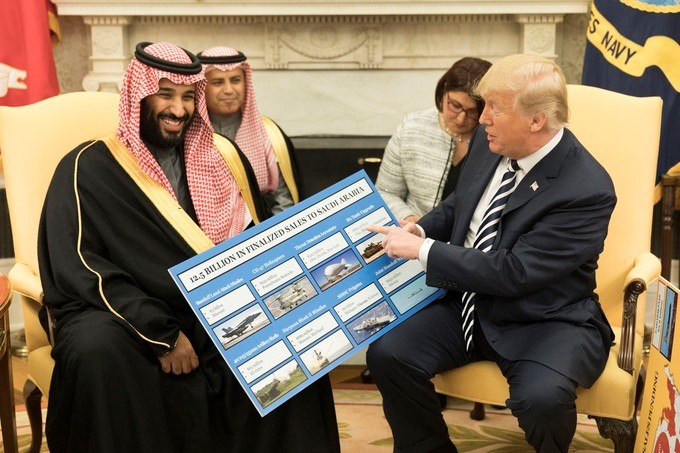By Erica Fein
President Trump has vetoed five bills this year. Four of them have dealt with U.S. support for the Saudi and Emirati (UAE) monarchies and their role in the now four-year-old brutal war and humanitarian nightmare in Yemen. Just last week, the Senate failed to override vetoes of back-to-back resolutions disapproving of Trump’s so-called emergency sales of weapons to these countries. Despite that failure, these vetoes aren’t the last word.
A bipartisan majority in Congress is fed up with Trump’s deference to Saudi Arabia and the UAE, which has allowed those countries to act with impunity under his administration’s watch. We should expect Congress to continue to try to counter his approach and provide needed oversight of how U.S. policy toward these countries damages long-term U.S. security interests, undermines human rights, perpetuates the suffering and destruction in Yemen, and could lead to war with Iran.
The Arms Sales Veto Override Failed—Now What?
Congress’s next move will come in September, when the House and Senate conference their versions of the fiscal year 2020 National Defense Authorization Act (NDAA). The House version includes language that both suspends precision guided munitions transfers, sales, or licenses to Saudi Arabia and the UAE for one year, and prohibits all U.S. military assistance for the coalition’s fight against the Houthis in Yemen.
The first provision, sponsored by freshman Rep. Tom Malinowski (D-NJ), who has made his career advocating for human rights, received support from the entire Democratic caucus and six Republicans and Independents. And the latter, sponsored by progressive foreign policy leader Rep. Ro Khanna (D-CA), passed with even more Republican/Independent support: 13 in total, with five Democratic defections. Importantly, it’s much harder for a president to veto an NDAA than it is standalone legislation. The question is whether either of these provisions can survive conference negotiations where the trio of Senate Majority Leader Mitch McConnell, Armed Services Chairman Jim Inhofe and Foreign Relations Committee Chairman Jim Risch stand in their way—alongside an adverse Trump administration.
The Saudi/Emirati-led coalition’s airstrikes, using U.S.-made precision-guided munitions, have been a leading cause of civilian deaths in Yemen—responsible for over 8,000 of the approximately 11,700 fatalities reported in connection with direct targeting of civilians in Yemen. Armed with these facts, the Senate and House have sought to use the United States’ considerable leverage to change the coalition’s behavior and push them to end the war.
Take for example, the bipartisan legislation led by Senate Foreign Relations Committee (SFRC) Ranking Member Bob Mendendez (D-NJ) and Senator Todd Young (R-IN)—and co-sponsored by none other than uber Iran hawk Lindsay Graham (R-SC)—the Saudi Arabia Accountability and Yemen Act. That measure recently passed out of the Senate Foreign Relations by a vote of 13-9. In some respects, the bill goes farther than the House NDAA language in that it suspends arms sales to Saudi Arabia for two years, rather than one. It does not, however, include a ban for the UAE. Even still, given this strong bipartisan and ideologically diverse support, it should not be out of the realm of the possible to retain the House language in the NDAA.
Similarly, given the House and Senate have several times now passed bills to end U.S. support for the Saudi-led coalition, in the form of aerial refueling of coalition aircraft, it would not be hard to imagine this language be included in a final NDAA.
Don’t Expect a Yemen-Less NDAA
So what happens if these provisions don’t stay in? While it would undoubtedly be a loss, there are other items that we should expect will be retained. An NDAA amendment by Tulsi Gabbard (D-HI) and Ted Lieu (D-CA), for example, prohibits certain military assistance to Saudi Arabia and the UAE if it is used for war in Yemen. In fact, the House passed so many Yemen-related NDAA amendments that we can’t name all of them here. And not to be ignored: the House-passed defense appropriations bill also contains the exact language of S.J.Res.7, the war powers bill passed by Congress and vetoed by Trump, which would be difficult but not impossible to keep in a final spending bill.
Holding Saudi Arabia and the UAE Accountable
Even in a world where most of these provisions can’t overcome an intractable Republican Senate and a Trump veto threat, we now live in a world where Congress won’t just give up. More work to end U.S. complicity in Yemen will be done even as Congress continues with other accountability measures. A bipartisan cadre in the Senate and House continue to introduce bills related to curtailing unfettered U.S. assistance with a Saudi civil nuclear energy program (that could easily one day become a weapons program), for example. The House Oversight and Government Reform Committee is conducting its own investigations into undue Saudi and Emirati influence over the Trump administration.
Does Congress Matter?
With Trump digging in, and the death toll and humanitarian crisis in Yemen increasing, one has to ask whether all of this congressional action really matters. The answer is that as long as the United States under Trump continues to put its thumb on the scale in the region, a congressional counterweight is vital—for its constitutional duties both in matters of war and peace and oversight of U.S. laws and policies. Despite the persistence of the Yemen war, congressional influence helped lead to a tenuous interim deescalation agreement between the warring factions in December. And the UAE’s recent announcement of a drawdown of forces can also be attributed to a combination of unrelenting congressional (and international and non-governmental) scrutiny, plus a very valid concern that it could get caught in the crosshairs of a Trump-initiated war with Iran.
The people of Yemen, and others throughout the region suffering from human rights violations at the hands of the Saudi and Emirati governments, deserve much better than they’re getting from the Trump-led U.S. government. Many in Congress understand the United States’ unique ability to create accountability for these abuses and want to do what they can to blunt the path we’re on. The NDAA provides that opening and it’s now up to the champions inside and outside of Congress to fight for it.
Erica Fein is the advocacy director at Win Without War, a diverse network of activists and national organizations working for progressive foreign policy in the United States. Follow her on Twitter @enfein.






“Caught in the crosshairs of a Trump-initiated war with Iran” – Right on, Erica Fein!
That’s what needs to be stopped in its onrushing Bolton-tracks — a Trump-initiated war.